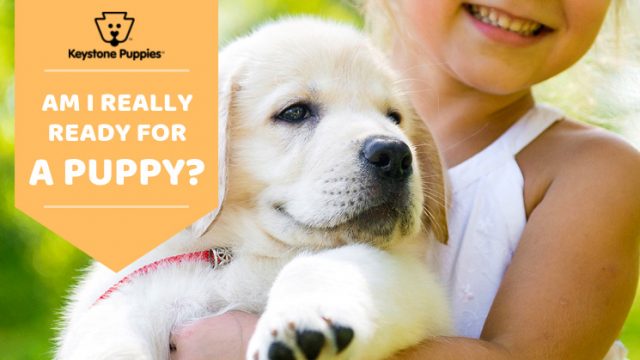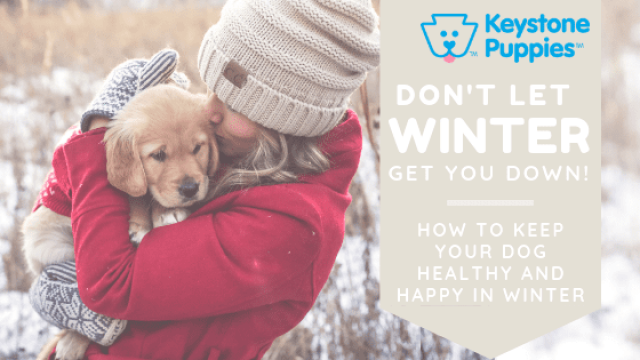Puppy Socialization: A Beginner’s Guide
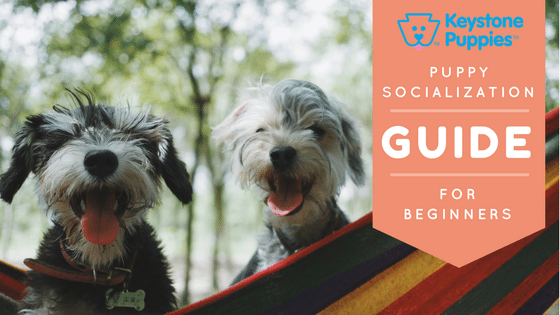
If you’ve been around dogs and puppies, you’ve probably noticed that some dogs play well with others. Some dogs are comfortable around people and day to day noises, while others seem stressed or nervous in new situations. Some dogs seem to make friends quickly. Other canines seem uncomfortable, restless, confused, or jumpy. What makes some dogs easy-going and popular, while others struggle?
Socialization is the process that puppies go through that shapes their personality and informs their reactions to their environment. A well-socialized dog understands how to interact with people and the physical world. He gets along well with other dogs, understands friendly and aggressive body language, and generally is more confident around new dogs.
If you’re thinking about bringing a puppy into your home, puppy socialization will be an important part of helping your dog gain the skills he needs to be a happy, well-adjusted pet.
Puppy Socialization Begins Early
Keystone Puppies does not offer puppies younger than eight weeks old. These first weeks are critical not only to the health of the pup, but also to allow him to learn basic socialization skills from his mother and his litter. His breeder ensures he is handled gently and appropriately by a limited number of people during this time.
Keep Your Pup Healthy
From eight weeks to four months, you can begin to expose your puppy to other people and animals within controlled environments. In these early months, it’s especially important that you stick to vaccination schedules and keep your young puppy away from sick people or ill pets. Puppies, like human babies, have developing immune systems and should not be exposed to large, unsupervised groups of people or animals.
Everything is new to a Puppy
You’ll be surprised at the things that frighten your new pup. Many young puppies dislike walking on tile or linoleum. Bubble wrap may throw your dog into a panic. Puppies must be taught how to walk up and down stairs. The sound of raising blinds send some pups running. Don’t worry. It’s normal. You’ll need to gently introduce your pup to a wide range of sights, sounds, textures, and environments. To help you get started, the American Kennel Club has developed a checklist of common items to which puppies may need to be acclimated. Check it out here.
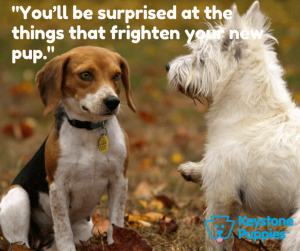
Start With Short Excursions Outdoors
During a pup’s first four months, you can begin exposing him to the sights and sounds of his world. If you live on a farm, let him get acclimated to the other animals on the farm. If you live in a city, start exposing your dogs to the sounds of traffic. He’ll probably start by smelling tentatively. Many puppies will shiver in fear on first outings. Start small, with short excursions, and slowly expand the time your dog spends in these new environments. Even five to ten minutes may be stressful for some pups, while others may be comfortable with longer stretches of time. How long you spend in new environments will depend on your pup’s disposition, your mood, and the variables in any new environment.
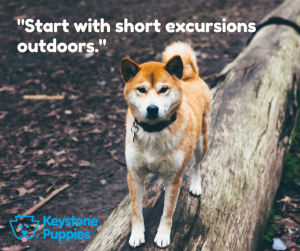
Help Your Puppy be People-Friendly
Work to make your dog comfortable with new people. Make sure your family spends time with your puppy. When you take your dog outside, many people will want to pet your puppy (because he’s adorable!) Allowing strangers to show affection to your dog helps him see people as friends. If your dog becomes lost, his attraction to people will be an asset. Approaching strangers, instead of running away from them, is more likely to connect him with someone who will help him find his way home.
Introduce Your Puppy to Other Canines
For many dog-owners, finding ways and places to introduce your new pup to other dogs is challenging. You want your dog to interact with other young canines, but you also want it to be a positive experience. Taking your pup for short walks on popular dog paths is one way to start. Sticking to parks and trails that require dogs be leashed ensures that your pup and other dogs are under control at all times.
Enrolling your puppy in obedience classes, once he is vaccinated, is not only a great way to start training your dog, but it also gives your pup a chance to see other dogs interacting with their owners. You’ll encounter the same dogs for several weeks in a row, and you’ll be guided by an experienced dog trainer.
Playdates with other puppy owners are a fun, easy way to let your puppy play safely with one or two other young dogs. Whether your play date is in the backyard, the living room, the local park, or the local pet store, introducing your dog to one or two special friends at a time is a low-stress way to increase your puppy’s social skills.
Dog parks are a good place for dogs to mix and mingle, but you may want to wait until your pup is older before letting him loose with other dogs. Young pups are at a disadvantage in groups of dogs and are easily intimidated or dominated. Once your pup is older than four months and completely vaccinated, find a dog park that divides play areas by size. Smaller dogs will play with other small dogs. Larger breeds mix with other large breeds. Try to plan your first visits during slow periods, when only a few other dogs are in the park. Start with short trips of 15 minutes or less, and build to longer time frames. Never bring a dog in heat to a dog park.
Which Breeds get Along Best With Other Dogs?
While dog breeds can be an indication of ability to get along with other canines, the way you socialize your puppy is the most influential factor. If you are patient and successfully socialize your puppy with people, environments, and other dogs, any breed can get along with other dogs.
Purina publishes a list of breeds that are most likely to be dog-friendly, which include:
Australian Shepherds, Beagles, Boston Terriers, Collies, English Springer Spaniels, German Shepherds, Golden Retrievers, Irish Setters, Maltese, Pekingese, Pugs, and Poodles.
For more research on breeds, visit Keystone Puppies’ list of over 200 breeds.
*****
Keystone Puppies cares about your dog’s well-being. Socialization is an important part of setting your puppy up for long-term success. If you haven’t decided which breed of dog is right for you, research over 200 breeds here. Want to search for your new puppy now? Click here to get started.





